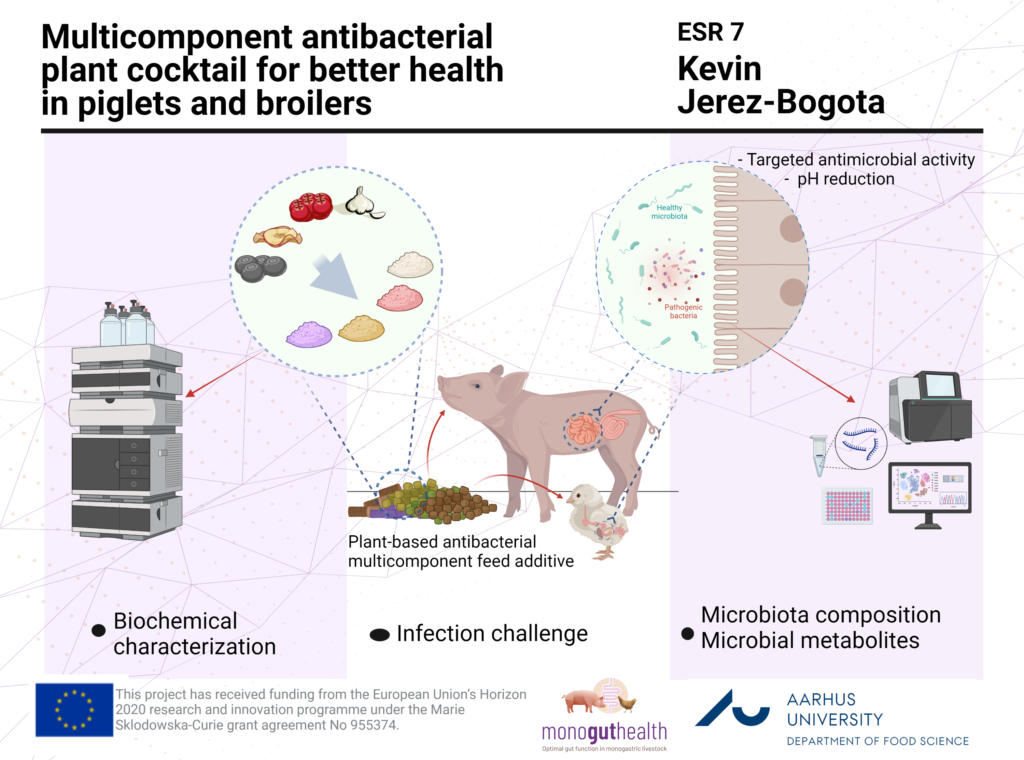ESR7: Multicomponent antibacterial plant cocktail for better health in piglets and broilers
Background
Diarrhea and related mortality of farm animals induced by pathogenic bacteria (i.e. E coli, Clostridium, CampylobacterA common bacteria present in poultry gut causing little to no clinical symptoms., Salmonella) is traditionally prevented by use of antibiotics and medical Zinc in weaning piglets and use of coccidiostats in poultry against zoonotic bacteria. Bacterial resistance build up against these compounds call for new and more natural sustainable solutions to maintain GITThe part of the digestive system that consists of the stomach and intestines. health and prevent disease.
Objectives
The objective is to investigate and innovate a new multicomponent antibacterial plant cocktail to prevent bacterial diseases in GITThe part of the digestive system that consists of the stomach and intestines. in weaning piglets and poultry.
The overall aim is to reduce the use of antibiotics and zinc oxideAn inorganic compound that is commonly used in animal feed as a zinc source. Zinc oxide has been use... for piglets, and of ionophore coccidiostats with antimicrobial properties for broilersChickens kept for meat production. Fast growing breeds can reach a weight of over 2 kg at 5 weeks of....
Methods
The project will investigate in vivo the effect of plant based antibacterial feed additivesProducts used in animal nutrition to achieve an effect on the feed itself, on the animals, on food p... on animal GITThe part of the digestive system that consists of the stomach and intestines. health using selected promising plant species either in single formulation or as a multicomponent antibacterial plant cocktail to avoid resistance build up.
Antibacterial compounds in plant species and developed feed additivesProducts used in animal nutrition to achieve an effect on the feed itself, on the animals, on food p... will be characterized biochemically and tested for their in vitro antimicrobial activity against animal pathogens (main focus E. coli and Clostridium perfringens).
Detailed effect of feed additivesProducts used in animal nutrition to achieve an effect on the feed itself, on the animals, on food p... on animal performance in vivo, including general health, GITThe part of the digestive system that consists of the stomach and intestines. health aspects and gut microbiota profile will be investigated.
Expected results
Develop and prove the beneficial effect of a plant-based antibacterial multicomponent feed additive, that avoids proliferation of gut pathogens and supports a healthy microbiota in the GITThe part of the digestive system that consists of the stomach and intestines. of piglets and broilersChickens kept for meat production. Fast growing breeds can reach a weight of over 2 kg at 5 weeks of... (D2.11).
Reduce the need for antibiotics , heavy metals, and coccidiostats (D3.2, D3.6).
Planned secondments
- At: TEAGASC (3 mo); Characterise differences in microbiota obtained from in vivo feeding trials with antibacterial plants;
- At: Nor-Add,Nor-Feed A/S (0.5 mo); Gain knowledge on industrial aspects of the animal feed additive business;
- At: DLG (0.5 mo); Receive training in commercial production and use of feed and feed additives in pig production, including sustainable pig production;
- At: CFF (0.5 mo); Receive training in R&D management and consulting in sustainable pig production.
Enrolment in Doctoral degree:
ESR7 will be enrolled at the Department of Food Science, Graduate School of Science and Technology, Aarhus University.
Supervisors
Martin Jensen (AU), Nuria Canibe (AU), Peadar Lawlor (TEAGASC), Paul Cotter (TEAGASC)
